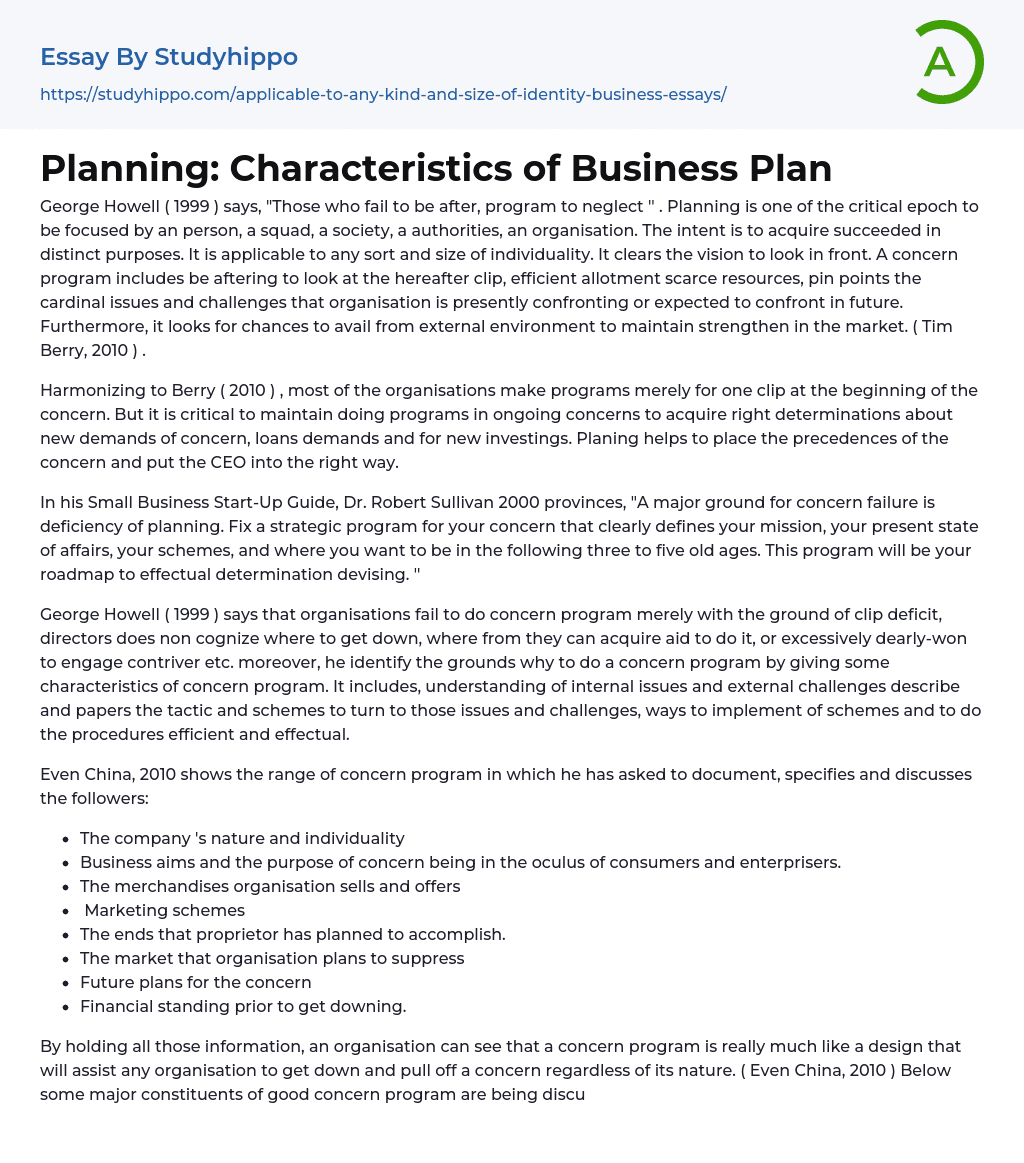According to George Howell (1999), failing to plan is planning to fail. Planning is crucial for individuals, teams, societies, governments, and organizations.
The goal is to achieve success in various objectives. It is suitable for any type and size of individuality. It enhances the ability to foresee the future. A business plan involves planning for future time, allocating resources effectively, identifying the key issues and challenges that the organization is currently or expected to face in the future.
Furthermore, it seeks opportunities to take advantage of the external environment in order to maintain market strength. According to Tim Berry (2010), many organizations only create plans for the initial stages of the business. However, it is crucial to continue making plans in ongoing businesses in order to make informed decisions about new business needs, loan requirements, and i
...nvestments. Planning helps identify business priorities and guide the CEO in the right direction.
Dr. Robert Sullivan's Small Business Start-Up Guide (2000) emphasizes the importance of planning in order to avoid failure. He advises creating a strategic plan that clearly outlines the mission, current situation, strategies, and desired future position over the next three to five years. This plan will serve as a roadmap for effective decision making. George Howell (1999) states that organizations often fail to develop a business plan due to a lack of time, uncertainty about where to start or where to seek assistance, or concerns about the cost of hiring a planner. Howell also identifies the reasons for creating a business plan by providing various characteristics of such a plan.
The text below discusses the importance of understanding internal issues and external challenges in a business
It emphasizes the need to document and discuss key aspects of a company, such as its nature, business aims, products, marketing strategies, goals, target market, future plans, and financial standing. By considering all this information, a business plan can be developed to effectively manage and start a business. This plan is likened to a design that guides any organization, regardless of its nature or profitability. The text then highlights some essential components of a good business plan that all types of organizations should consider.
A comprehensive business plan should cover all aspects of the business, including details about the merchandise and services offered. This includes listing the products, providing a description, and specifying the scope of goods. The plan should be research-based, including information on both national and international competitors, their market share percentages, market positioning, and product range. By analyzing competitor activities, a successful business plan should establish industry benchmarks and outline innovative operational strategies to maximize efficiency.
A business program cannot be perfect if it has not included the requirements and needs of the organization to conduct all operational and administrative activities. This includes equipment, technology to be used, types of materials, cash for daily activities, additional investments, and other resources needed to run any activity. This will give an idea to the business about how much capital is required to operate and maintain it. The plan should be formal and properly formatted as it may be presented in front of business partners or external parties such as financial institutions or banks.
Furthermore, the concern program must be regularly updated to reflect the current state of affairs. Additionally, it is crucial for a good concern program
to be error-free as it is a representation of one's identity as a businessperson. Sloppiness in the concern program reflects poorly on the business. Moreover, the use of slang should be avoided to create a professional business plan. According to Richard Bowett (2010), decision-making now occurs at all levels of a business.
The Board of Directors is responsible for making strategic decisions regarding investments and future growth, while directors make tactical decisions on how their own department can contribute to the overall business objectives. However, regular employees are now being increasingly relied upon to make decisions about their own tasks, customer responses, and business improvements. This requires careful hiring and selection, thorough training, and enlightened management.
- Accounting essays
- Marketing essays
- Automation essays
- Business Cycle essays
- Business Model essays
- Business Operations essays
- Business Software essays
- Corporate Social Responsibility essays
- Infrastructure essays
- Logistics essays
- Manufacturing essays
- Multinational Corporation essays
- Richard Branson essays
- Small Business essays
- Cooperative essays
- Family Business essays
- Human Resource Management essays
- Sales essays
- Market essays
- Online Shopping essays
- Selling essays
- Strategy essays
- Management essays
- Franchising essays
- Quality Assurance essays
- Business Intelligence essays
- Corporation essays
- Stock essays
- Shopping Mall essays
- Harvard Business School essays
- Harvard university essays
- Trade Union essays
- Cooperation essays
- News Media essays
- Waste essays
- Andrew Carnegie essays
- Inventory essays
- Customer Relationship Management essays
- Structure essays
- Starting a Business essays
- Accounts Receivable essays
- Auditor's Report essays
- Balance Sheet essays
- Costs essays
- Financial Audit essays
- International Financial Reporting Standards essays
- Tax essays
- Accountability essays
- Cash essays
- Principal essays




